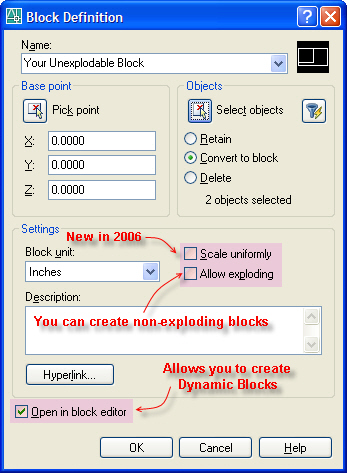


You can control the target Layer, Line type, Line weight and Colour, or Inherit all properties from the Block insertion. The XPLODE command (note the missing E) works similarly to EXPLODE except it permits users to override component entity properties. When exploding a Block of this type, all the components revert to Layer 0. Often a Block is created from entities defined on Layer 0, so that it can be inserted on any Layer and thus inherit the properties of the insertion Layer.

It is worth considering when using the standard Explode function on a Block that it can sometimes yield undesirable results. Therefore, using the Block Editor might be a better solution for updating block definitions. It tends to make excessively sized drawing files, slow file performance and loss of productivity.Įxploding a block was the classic approach to edit it, although this can impact on possible schedules and the general quality of the drawing. For further guidance it may be worth consulting a more experienced AutoCAD colleague.Įxploding hatch objects seems to be common practice with untrained CAD users. I find the AutoCAD Properties Override, Match properties, Grip controls or Add Selected function resolves many of the arguments of why people use explode.

If these elements do need to be changed, then edit its properties to suit. Hatches, dimensions and leaders cannot be so easily repaired and as a rule should never be exploded. Lines and arcs can be converted back to polylines (useful for areas and lengths) and text objects can be converted back to paragraph style multi-line text. Of course, just because we can do a thing, doesn’t mean that we should. Explode Polylines, Multi-lines, Hatches, Dimensions and Leaders into Lines, Arcs, Text etc. The EXPLODE command allows you to convert complex objects to their constituent components.


 0 kommentar(er)
0 kommentar(er)
